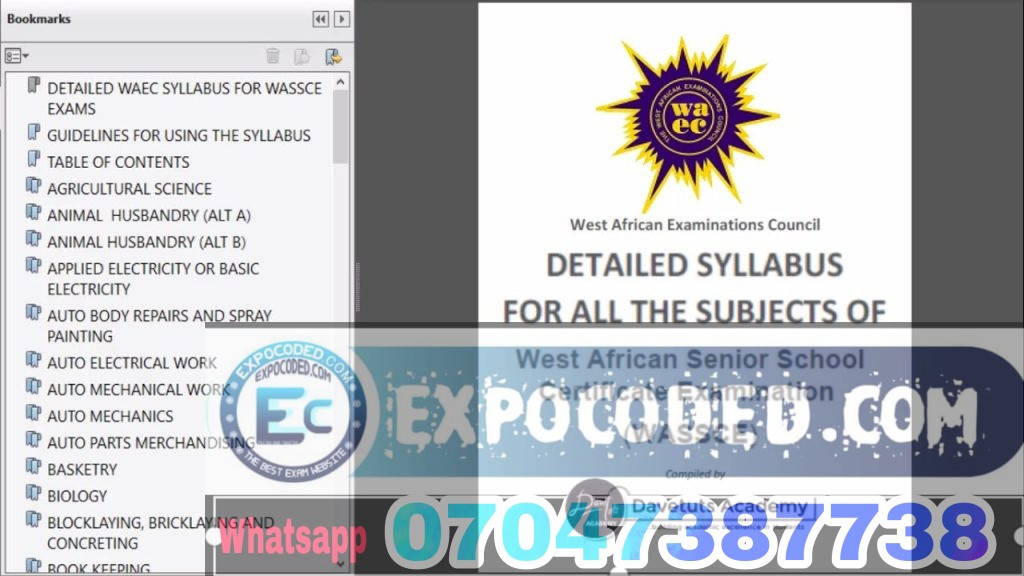WAEC Syllabus for Government 2024/2025
Are you preparing for the West African Examinations Council (WAEC) Senior Secondary Certificate Examination (SSCE) in government? Do you want to know the areas of concentration, aims and objectives, topics, and recommended textbooks for this subject? If yes, then you are in the right place.
In this blog post, we will provide you with a comprehensive guide on the WAEC syllabus for government 2024/2025, covering all the essential information you need to ace this exam. We will also answer some of the most frequently asked questions about the syllabus and give you some tips on how to study effectively.

What is the WAEC Syllabus for Government?
The WAEC syllabus for government is a document that outlines the scope and content of the government curriculum for the SSCE. It specifies the learning outcomes, objectives, topics, and sub-topics that candidates are expected to cover in preparation for the exam. It also lists the recommended textbooks and references that candidates can use to supplement their learning.
The syllabus is designed to help candidates achieve the following aims and objectives:
- To develop an understanding of the concepts, principles, and theories of government and politics.
- To acquire knowledge of the historical and contemporary political and constitutional developments in West Africa and the world.
- To appreciate the role and functions of government and its organs at various levels.
- To analyze the structure and characteristics of different types of government and political systems.
- To evaluate the impact of government policies and actions on the society and the environment.
- To develop critical thinking, communication, and civic skills for active participation in the democratic process.
How to Download the WAEC Syllabus for Government 2024/2025
The WAEC syllabus for government 2024/2025 is available for free download on the official website of the WAEC. You can also access it from other reliable sources such as expocoded.com and WAEC2024. To download the syllabus, follow these steps:
- Visit the website of your choice and search for the WAEC syllabus for government 2024/2025.
- Click on the link to open the syllabus in PDF format.
- Save the syllabus to your device or print it out for easy reference.
Alternatively, you can click on the link below to download the syllabus directly:
Download WAEC Syllabus for Government 2024/2025
List of Topics in the WAEC Syllabus for Government 2024/2025
The WAEC syllabus for government 2024/2025 is divided into two sections: Section A and Section B. Section A covers the elements of government, while Section B covers the political and constitutional developments in West Africa and international relations. Here is a summary of the topics and sub-topics in each section:
Section A: Elements of Government
- Meaning and scope of the subject matter – government
- Definition and scope of government
- Definition and scope of politics
- Relationship between government and politics
- Basic concepts and principles of government
- Power, authority, legitimacy, and sovereignty
- Democracy, dictatorship, and constitutionalism
- Separation of powers, checks and balances, and rule of law
- Rights, duties, and obligations of citizens
- Political culture, socialization, and participation
- Constitutions
- Definition and types of constitutions
- Sources and features of constitutions
- Functions and amendment of constitutions
- Supremacy and rigidity of constitutions
- Organs of government
- The legislature: functions, types, and structures
- The executive: functions, types, and structures
- The judiciary: functions, types, and structures
- The relationship and interdependence among the organs of government
- State structure and characteristics of government
- Unitary and federal systems of government
- Presidential and parliamentary systems of government
- Monarchy and republicanism
- Centralization and decentralization of power
- Regionalism and devolution of power
- Citizenship
- Definition and types of citizenship
- Ways of acquiring and losing citizenship
- Rights and duties of citizens
- Problems of citizenship and nationality
- Dual citizenship and statelessness
- Political parties and party systems
- Definition and functions of political parties
- Types and features of political parties
- Party systems: one-party, two-party, and multi-party systems
- Party ideologies and manifestoes
- Party organization and discipline
- Pressure groups, public opinion, and mass media
- Definition and functions of pressure groups
- Types and features of pressure groups
- Methods and problems of pressure groups
- Definition and functions of public opinion
- Factors and measurement of public opinion
- Definition and functions of mass media
- Types and features of mass media
- Roles and problems of mass media
- The electoral systems, processes, and electoral management body
- Definition and types of electoral systems
- Features and advantages of electoral systems
- Electoral processes: registration, nomination, campaign, voting, and counting
- Electoral malpractices and reforms
- Electoral management body: functions and problems
- Public/civil service administration
- Definition and features of public/civil service
- Functions and structures of public/civil service
- Roles and problems of public/civil service
- Reforms and control of public/civil service
Section B: Political and Constitutional Developments in West Africa and International Relations
- Colonial administration
- Reasons and methods of colonialism
- Features and impact of colonial administration
- Forms of colonial administration: direct and indirect rule
- Merits and demerits of direct and indirect rule
- Nationalism in candidates’ respective countries
- Definition and factors of nationalism
- Phases and methods of nationalism
- Roles and problems of nationalists
- Achievements and limitations of nationalism
- Constitutional developments in candidates’ respective countries
- Pre-independence constitutions: features and problems
- Post-independence constitutions: features and problems
- Constitutional crises and changes
- Development of major political parties in the candidates’ respective countries
- Emergence and growth of political parties
- Ideologies and objectives of political parties
- Roles and achievements of political parties
- Problems and decline of political parties
- Military rule in the candidates’ respective countries
- Causes and features of military rule
- Advantages and disadvantages of military rule
- Roles and impact of military rule
- Transition and return to civilian rule
- Foreign policies of the candidates’ respective countries
- Definition and determinants of foreign policy
- Aims and objectives of foreign policy
- Instruments and implementation of foreign policy
- Achievements and challenges of foreign policy
- International organizations
- Definition and types of international organizations
- Aims and objectives of international organizations
- Structures and functions of international organizations
- Roles and problems of international organizations
List of Recommended Textbooks for the WAEC Syllabus for Government 2024/2025
The WAEC syllabus for government 2024/2025 provides a list of recommended textbooks and references that candidates can use to enhance their learning and understanding of the subject. Here are some of the books that are suggested by the syllabus:
- Adigwe, F (1985) Essentials of Government for West Africa, Ibadan: University Press Plc.
- Anifowose, R and Enemuo, F. C (eds)(1999) Elements of Politics, Lagos; Malthouse Press Limited.
- Appadorai, A. (1978) The Substance of Politics, London: Oxford University Press.
- Ball, A. R. (1983) Modern Politics and Government, London: Macmillan.
- Ofoegbu, R. (1977) Government for the Certificate Year, London: George Allen and Unwin.
- Oyediran, O. Nwosu, H., Takaya, B., Anifowoshe, R., Fadakinte, G. M and Mohammed, A. (2000) Government for Senior Secondary Schools, Books 1, 2 and 3, Ibadan: Longman.
- Oyeneye, I., Onyenwenu, M. and Olusunde, B. E. (2000) Round-Up Government for Senior Secondary School Certifcate Examination: A complete Guide, Ibadan: Longman.
How to Effectively Use the WAEC Syllabus for Government
The WAEC syllabus for government 2024/2025 is a useful tool for candidates who want to excel in the exam. However, merely downloading and reading the syllabus is not enough. Candidates need to use the syllabus effectively and strategically to maximize their performance. Here are some tips on how to do that:
- Study the syllabus carefully and understand the aims, objectives, topics, and sub-topics that are required for the exam.
- Plan your study schedule and allocate enough time for each topic and sub-topic. Use a calendar or a planner to keep track of your progress and deadlines.
- Use the recommended textbooks and references to supplement your learning and gain more insights and examples. You can also use other reliable sources such as online articles, videos, podcasts
Here is a summary and some FAQs about the WAEC Syllabus for Government 2024/2025:
- The WAEC Syllabus for Government 2024/2025 is a guide for students and teachers on the topics, concepts, and objectives that will be assessed in the examination.
- The syllabus has been updated to reflect the latest changes in the curriculum and the contemporary political issues and global perspectives.
- The syllabus covers four main sections: Introduction to Political Science, Comparative Government, International Relations, and Political Ideologies.
- The syllabus also provides a list of recommended textbooks and references for further reading and preparation.
Some FAQs are:
- Q: How can I download the WAEC Syllabus for Government 2024/2025?
- A: You can download the syllabus for free from various websites, such as expocoded.com.
- Q: What are the benefits of studying the WAEC Syllabus for Government 2024/2025?
- A: Studying the syllabus can help you to focus your preparation on the most relevant and high-weighted topics, align your learning with the curriculum changes, and gain a comprehensive understanding of government studies.
- Q: How can I excel in Government with the WAEC Syllabus?
- A: To excel in Government, you should study the syllabus thoroughly, understand the basic political concepts and principles, compare and contrast different government systems and ideologies, analyze the impact of globalization and international relations on government policies, and practice with past questions and answers.
